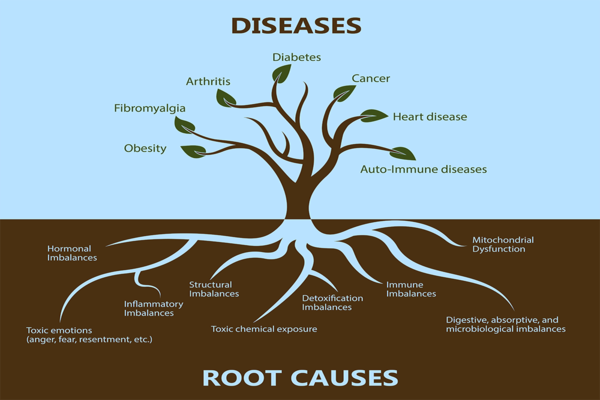Functional Medicine: A Holistic Approach to Health and Wellbeing
- Harmony
- 5 Min
- August 16, 2024
- Dr. Mark
- Future Medicine, Mind care, Wholeness
Science-based approach to healthcare that views the body as an interconnected system.
Are you trying to make choices more holistically about your health? Functional medicine’s whole-person perspective could offer the path you have been seeking along your journey to healthy living. We’re going to go over its primary attributes, methods of procedure, ways it differs from conventional treatments, and advantages it offers for treating persistent diseases and enhancing general health.

What is Functional Medicine?
Functional medicine is a patient-centered approach that defines well-being through a framework of interrelated systems in the body. As opposed to only treating the symptoms, it concentrates on identifying and treating the root cause of your medical conditions.
It seeks to regulate persistent illnesses and enhance overall well-being by seeing the body as an integrated system. Functional medicine, as defined by Dr. Mark Hyman, is about recognising each person’s specific needs and implementing the appropriate mixture of treatments—including conventional therapies when needed—not about a single test or tablet.
Key aspects consist of:
- Customized therapy depending on the patient’s medical history and way of life.
- Exploring the interactions between each of the systems of the body
- The emphasis is on preventing ailments and resolving their underlying causes.
History
Although originally offered in the 1990s, functional medicine meaning is now gaining recognition as an alternative for conventional medical therapy. It was set up by Jeffrey Bland and combines clinical experience with modern developments in the medical sciences for managing chronic ailments.
The Institute for Functional Medicine states: “Functional Medicine determines how and why illness occurs and restores health by addressing the root causes of disease for each individual.”
Comparing Healthcare Approaches
Conventional Medicine: Typically focuses on symptom management using standardized treatments.
Alternative Medicine: Often emphasizes natural remedies but may lack robust scientific validation.
Functional Medicine: Bridges these approaches, utilizing evidence-based methods to address overall health.
Core Principles of Functional Treatment
- Whole-Body Focus: Treating the body as an interconnected system.
- Root Cause Analysis: Identifying underlying factors contributing to health issues.
- Personalized Care: Tailoring treatments to individual needs and circumstances.
- Collaborative Approach: Engaging patients as active participants in their health journey.
- Preventive Emphasis: Prioritizing wellness maintenance and disease prevention.
Benefits of Functional Medicine
Functional medicine has multiple benefits, starting with the fact that it focusses on care which is focused on each individual. In order to identify the root cause of health problems and make a customised plan, it checks at your medical history and your lifestyle. This method incorporates alternative treatments, traditional medicine, changes to the food choices, and shifts in habits to offer an effective treatment. It’s especially helpful for people with persistent issues like diabetes and autoimmune illnesses. Focussing on long-term health and safety, functional medicine meaning can also help keep healthcare prices affordable in the future. Plus, it helps with your mental and physical well-being, giving you an entire way to be healthy.
Procedure of Functional Medicine Treatment
In order to figure out your particular requirements and difficulties, an exhaustive review of your past health conditions is the first step in the functional medicine treatment process. After that, detailed medical testing is performed to obtain an accurate picture of your current level of health. These findings are used to create a personalized treatment plan consisting of changes in diet, changes in habits, and therapies that have been customized to meet your needs. Finally, constant support is provided to you, and adaptations are made on a regular basis as needed to ensure the ideal, affordable result.
Who Might Benefit?
Anyone can use functional medicine, but it’s particularly suitable for those who haven’t found success with conventional treatments or whose conditions have worsened. Functional medicine is effective for:

- Thyroid Dysfunction
- Digestive Issues
- Emotional Stress
- Blood Sugar Problems
- Hormone Imbalances
- Immune Disorders
- Heavy Metal Toxicity
- Food Sensitivities
Safety Considerations
Safety is key when it comes to functional medicine. Always work with certified practitioners to ensure treatments are tailored to your needs. Keep clear communication with all your healthcare providers so everyone is on the same page. Stick closely to your personalized treatment plan, and address any concerns or health changes immediately to keep your care both safe and effective.
Bottom Line
Each individual’s health journey is different, and we are here to offer specific treatments like diabetes management and gut health restoration that integrate conventional Ayurvedic principles with modern, functioning medicine. Our certified team will help you each step of the way on your path to wellness by providing constant support and advanced checks.
- Table of Contents
- • Introduction
- • Core Principle
- • Benefits
- • Consideration
- • Bottom Line
Recent Posts
Join Our Newsletter
End note from WG Team
Dr. Geetha Kamath
Physician
Disclaimer: This information is provided for educational purposes and should not be construed as medical advice. Please consult with healthcare practitioners before undertaking any changes in wellness routines or adding new therapies.
Latest Blogs
Check out some of your blogs related to your interest.
- January 4, 2026
- Marc Cohen, MBBS (Hons)
- 3 Mins
- December 28, 2025
- Dr. Pauline Boss
- 3 Mins
- November 30, 2025
- Dr. Peter Levine
- 3 Mins

- August 15, 2025
- Dr. Prerna Kohli
- 3 Mins






